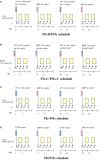Toxicity Syndromes, Patient-Related Clinical Indicator of Toxicity Burden Induced by Intensive Triplet Chemotherapy-Based Regimens in Gastrointestinal Cancers With Metastatic Disease
- PMID: 32154172
- PMCID: PMC7044407
- DOI: 10.3389/fonc.2020.00172
Toxicity Syndromes, Patient-Related Clinical Indicator of Toxicity Burden Induced by Intensive Triplet Chemotherapy-Based Regimens in Gastrointestinal Cancers With Metastatic Disease
Abstract
Background: Cancer treatments induce symptoms/signs superimposing on individual patient's clinical status, determining heterogenous toxicity syndromes (TS). We reviewed intensive first line triplet chemotherapy-based regimens in metastatic gastro-intestinal cancers (mGI), based on FIr/FOx schedule, fluorouracil and weekly alternating irinotecan/oxaliplatin, to point out limiting TS (LTS) relevance. Methods: Metastatic colo-rectal (mCRC), pancreatic ductal adenocarcinoma (mPDAC), gastric carcinoma (mGC) patients were enrolled by careful decision-making including age, performance status (PS), and comorbidity status in real life phase II studies: FIr-B/FOx adding bevacizumab (B) overall, FIr-C/FOx-C adding cetuximab (C) in KRAS/NRAS wild-type mCRC; FIr/FOx in mPDAC; FD/FOx adding docetaxel (D) in mGC. Toxicity, individual LTS, LT alone (LTS-single site, LTS-ss) or associated to other limiting/G2 toxicities (LTS-multiple sites, LTS-ms) were evaluated, compared by chi-square test. In FIr-C/FOx-C, 5-fluorouracil/irinotecan pharmacogenomic biomarkers, 5-fluorouracil degradation rate (5-FUDR), SNPs ABCB1, CYP3A4, DYPD, UGT1A1 were evaluated, related with LTS. Results: FIr-B/FOx, FIr-C/FOx-C in mCRC, FIr/FOx in mPDAC, FD/FOx in mGC, showed activity, efficacy, toxicities similar to reported triplet regimens. LTS: mCRC FIr-B/FOx 44%, LTS-ms 24%, LTS-ss 20%, in young-elderly 46%, LTS-ms significantly increased vs. LTS-ss; FIr-C/FOx-C 65.5%, significantly increased LTS-ms vs. LTS-ss, in young-elderly 83%; mPDAC FIr/FOx 27.5%, mostly LTS-ms, in young-elderly 38.4% all LTS-ms; mGC FD/FOx 30%, all LTS-ms, in young-elderly 25%. Reduced FUDR, SNPs CYP3A4, UGT1A1, >1 positive pharmacogenomic biomarkers were prevalent in patients with gastrointestinal LTS. Conclusions: LTS is an innovative clinical parameter of toxicity burden, differential treatment-related TS in individual patient. LTS can evaluate pharmacogenomic biomarkers predictive relevance to select mGI patients fit for intensive treatments, at risk of limiting gastrointestinal toxicity. Trial Registrations: The trials were registered at Osservatorio Nazionale sulla Sperimentazione Clinica dei Medicinali (OsSC) Agenzia Italiana del Farmaco (AIFA) Numero EudraCT 2007-004946-34, and Osservatorio Nazionale sulla Sperimentazione Clinica dei Medicinali (OsSC) Agenzia Italiana del Farmaco (AIFA) Numero EudraCT 2009- 016793-32.
Keywords: individual limiting toxicity syndromes; intensive first line; metastatic gastrointestinal cancer; real life; timed-flat-infusion 5-fluorouracil administration; triplet chemotherapy-based regimens; weekly alternating schedule.
Copyright © 2020 Bruera and Ricevuto.
Figures
References
-
- Bruera G, Ricevuto E. Intensive chemotherapy of metastatic colorectal cancer: weighing between safety and clinical efficacy. Evaluation of Masi G Loupakis F Salvatore L. Bevacizumab with FOLFOXIRI (irinotecan, oxaliplatin, fluorouracil, and folinate) as first-line treatment for metastatic colorectal cancer: a phase 2 trial. Lancet Oncol 2010;11:845-52. Expert Opin. Biol. Ther. (2011) 11:821–4. 10.1517/14712598.2011.582462 - DOI - PubMed
-
- Bruera G, Santomaggio A, Cannita K, Lanfiuti Baldi P, Tudini M, De Galitiis F, et al. Poker association of weekly alternating 5-Fluorouracil, Irinotecan, Bevacizumab and Oxaliplatin (FIr-B/FOx) in first line treatment of metastatic colorectal cancer: a phase II study. BMC Cancer. (2010) 10:567. 10.1186/1471-2407-10-567 - DOI - PMC - PubMed
-
- Bruera G, Massacese S, Pepe F, Malapelle U, Dal Mas A, Ciacco E, et al. Intensive first line FIr-C/FOx-C association of triplet chemotherapy plus cetuximab in RAS wild-type metastatic colorectal cancer patients: preliminary phase II data and prediction of individual limiting toxicity syndromes by pharmacogenomic biomarkers. Ther. Adv. Med. Oncol. (2019) 11:178835919846421. 10.1177/1758835919846421 - DOI - PMC - PubMed
-
- Garufi C, Torsello A, Tumolo S, Ettorre GM, Zeuli M, Campanella C, et al. Cetuximab plus chronomodulated irinotecan, 5-fluorouracil, leucovorin and oxaliplatin as neoadiuvant chemotherapy in colorectal liver metastases: POCHER trial. Br. J. Cancer. (2010) 103:1542–7. 10.1038/sj.bjc.6605940 - DOI - PMC - PubMed
LinkOut - more resources
Full Text Sources
Miscellaneous


